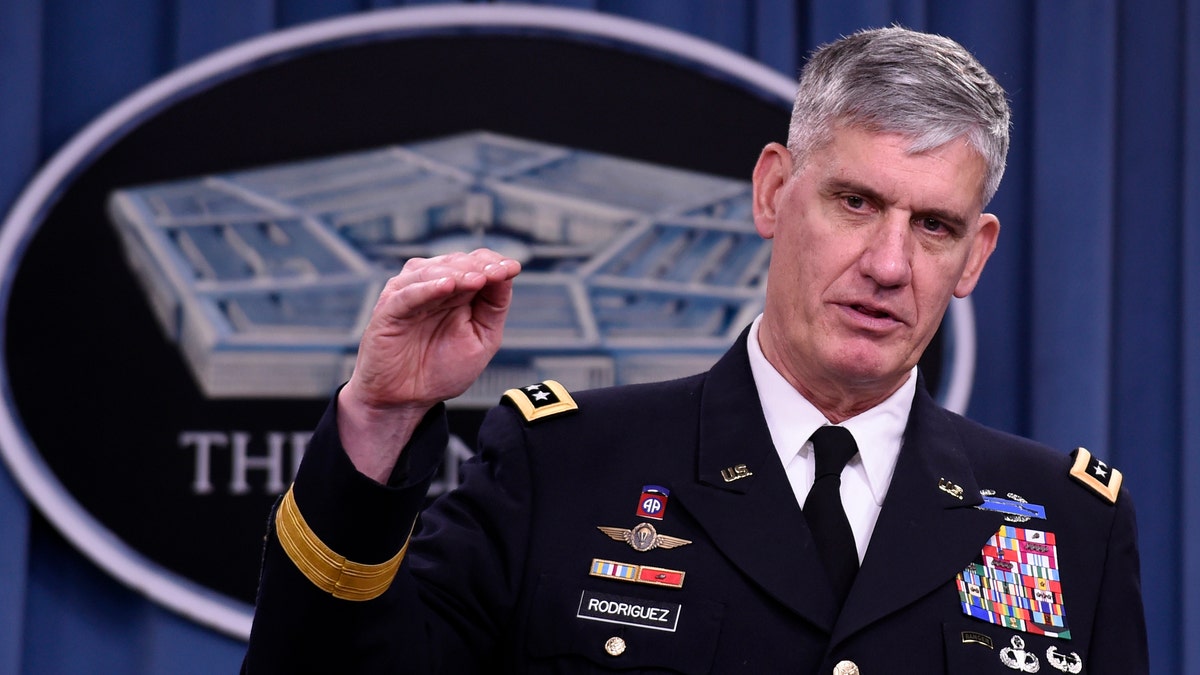
US Africa Commander Gen. David Rodriguez during a news conference at the Pentagon, Tuesday, Oct. 7, 2014. (ap)
The mission: help fight Ebola.
The price tag: $750 million.
U.S. Army Gen. David Rodriguez, who commands U.S. troops in Africa, said on Tuesday that military efforts to construct treatment facilities, set up more labs and conduct testing and training in Africa to deal with the Ebola crisis are expected to cost $750 million over six months.
Rodriguez said the U.S. has been asked to set up four more testing labs, in addition to the three already there. He said three or four highly trained U.S. troops work in each of the labs.
The U.S. troops in the labs are testing specimens drawn by local hospitals and health care workers in order to help determine whether patients have the deadly Ebola virus. The troops do not come in contact with the actual sick patients, but handle only the samples.
Asked whether the military response to the crises has been slow, Rodriguez said one of the challenges has been the ability of Liberia to absorb the influx of people and infrastructure changes.
"Their whole nation is overwhelmed. Their health facilities are overwhelmed," said Rodriguez, head of U.S. Africa Command. "Their infrastructure and their capacity to house people, to feed people and all that is limited. So it's all going to have to come in, in a very, very carefully orchestrated — based on the demand out at the front."
He added that U.S. officials "don't want to overwhelm them and press things in there that cannot — they can't absorb at all."
The U.S. has authorized the deployment of up to 4,000 U.S. forces to help deal with the crisis, and Rodriguez said he doesn't expect to need more than that, but didn't rule out expanding the effort.
He also said he is confident that the troops will be sufficiently trained and equipped with protective garments in order to avoid getting infected. The troops are providing logistics, training, diagnostic labs and engineering support as part of a broader U.S. effort.
In particular, he said the troops staffing the labs are highly trained in biological, chemical and nuclear warfare and will be monitored and tested continually. He said the testing is critical now as officials try to differentiate between people who have the Ebola virus or those that may have the flu or malaria.
He said the U.S. has enough protective equipment for the troops being sent in.
Forces from the 101st Airborne Division at Fort Campbell, Kentucky, are preparing to go to Africa. Rodriguez said troops will be living at defense ministry facilities or in tent cities with their own food and water.
"When you go in one of these Ebola treatment units, you're going to wash your hands and feet multiple times. You're going to get your temperature taken in and out. And then there is a checklist of things to ask each personnel based on the — the virus or any other sickness, quite frankly, that could be coming up," Rodriguez said.
The military expects to finish the construction of 17 treatment centers by mid-November, but Rodriguez said troops could be in the region for as long as a year, based on how long it takes for the transmission of the virus to begin to decline.
"We're going to stay as long as we're needed, but not longer than we're needed," he said.
Based on reporting by The Associated Press.
Follow us on twitter.com/foxnewslatino
Like us at facebook.com/foxnewslatino




















